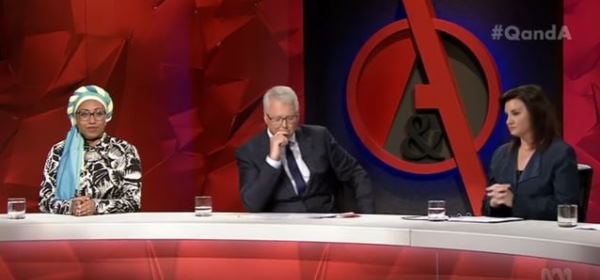Monday night’s Q&A saw one of its most explosive confrontations yet, with a question about immigration leading to a full-blown yelling match between Senator Jacqui Lambie and UN Muslim Youth Without Borders Founder, Yassmin Abdel-Magied.
The topic of discussion was on mass cross-culture migration putting “the idea of democracy in question”. An audience member asked that because “people come with different cultures, experiences and expectations,” isn’t it “time for the democratic leaders of the world to identify and define the rules so that migration doesn’t disturb the peace and harmony of the community?”
The Tasmanian senator said she believed Australia should “look after our own backyard first” and should “follow Donald Trump’s example by deporting all Muslims who support Sharia law”.
Making reference to the one-third of pensioners living on or below the poverty line and young ice-addicted kids, Lambie said, “Something needs to be done and if that means we need to put a hold or a ban on that for two years to make sure that those in our own backyard get what is needed, so be it.”
She then said, “Anyone who supports Sharia Law in this country should be deported,” prompting 24-year-old activist Abdel-Magied to interrupt with, “Do you know what Sharia law is? ” and insisting that it was as simple as “me praying five times day”.
In the heated footage of the show, Ms Lambie is seen replying, “What about rights for women? You can’t be a Sharia law supporter and be half pregnant at the same time.”
Her voice rising, Ms Abdel-Magied demanded, “What are you talking about?” before regaining composure to say:
“Okay, I am not going to attack you personally. My frustration is that people talk about Islam without knowing anything about it and they’re willing to completely negate any of my rights as a human being, as a woman, as a person with agency, simply because they have an idea about what my faith is about. Excuse me, Islam to me is the most feminist religion, right. We got equal rights well before the Europeans.
“We don’t take our husbands’ last names … we were given the right to own land. The fact [is that] people go around dissing in my faith without knowing anything about it, and want to chuck me out of a country,” she said.
Senator Lambie responded: “We have one law in this country and it is the Australian law. It is not Sharia law, not in this country. Not in my day.” To which Ms Abdel-Magied vehemently replied, “In Sharia it says you follow the law of the land on which you are on.”
Both panel members were visibly flustered but managed to control themselves after host Tony Jones broke in with the warning: “Can I say, shouting at each other is not going to help.” Only Ms Abdel-Magied apologised, admitting that her outburst was “unbecoming”.
The Sudanese-born Australian then turned to Lambie to say, “It hurts me deeply, right, when you, when my elected representatives, don’t want to have me in this country simply because of my faith or because of where I was born. And I think this kind of rhetoric is what we saw pre-World War II.”
The furore has sparked an important debate within the Australian community about the level of knowledge that people have of foreign religions and cultures, and making judgements.
Read more at ABC.net.au
Opinion: What kind of Australia do we want?
It’s ironic that a question on whether it was time to define new rules surrounding immigration in order to avoid community conflict, led to a scuffle between two people on opposite sides of the issue.
A large proportion of Australians are particularly against Muslim immigration, despite the actual number of Muslims in the country being small. The reasons for this appear to be the fear that Muslim migrants ‘threaten’ Australian society.
The results of the Essential Research poll, published in September last year showed that 49 per cent of Australians support a ban on Muslim immigration, including 60 per cent of Coalition voters, 40 per cent of Labor voters and 34 per cent of Greens voters. Additionally, according to a study released in January last year by the University of South Australia’s International Centre for Muslim and non-Muslim Understanding, one in 10 Australians are highly Islamophobic.
However, it should be noted that while Islam is the fastest-growing religion in the world – it is not in Australia. Data from the Pew Research Centre shows that the 2011 Census revealed that 2.2 per cent of Australians (just 476,300 people) identified as Muslim. And this figure is not showing signs of rapid growth (the results of the latest 2016 Census haven’t been released yet).
In the midst of so many current political discussions of what should be done to protect local and global communities, it’s important for us not to lose our heads. We have to be smarter and more socially intelligent than the politicians, who will use any tactic to get us onside with their party, policy and agenda.
In terms of threats to our freedom as Aussies, the statistics speak for themselves to negate this. We must resist falling into the ‘fear trap’ of believing that just because someone is different, they are a threat – or that they can be grouped in with those individuals who are threatening.
Personally, I want to live in a country that doesn’t just call itself culturally diverse in its tourism ads, but where people actively encourage diversity, difference, and cultural expansion in day-to-day life. The fact is, we live in a globalised world, and it’s only getting smaller.
What do you think? What kind of Australia do you want to live in? Are Australians too willing to make assumptions before knowing the facts?
The Australian has also released this informative guide explaining the ins and outs of Sharia law.
Related articles:
Hanson pushes for burqa ban
Hanson: What is ‘Aboriginal’?
What is Australia’s largest religion?

